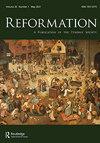Sixteenth-Century Readers, Fifteenth-Century Books: Continuities of Reading in the English Reformation
IF 1.1
0 RELIGION
引用次数: 1
Abstract
Responsio ... ad Martinum Lutherum haeresearcham. This was immediately translated into English and German, with editions printed in London, Dresden, Cologne, Cracow, Ingolstadt, Hagenau, Rome, Leipzig and so on. Obviously Luther was embarrassed and angry, and of course he responded to Henry’s Responsio, making matters worse: a lame explanation of his actions was accompanied by a renewal of his initial furious attack from 1521. These are the central documents of the “Second Controversy,” contextualized, edited, translated, and analyzed by Rex. From my point of view, the most interesting one is Henry’s Responsio to Luther’s letter. It is much shorter than Henry’s Assertio septem sacramentorum of 1521, but I daresay more substantive. Here Henry, perhaps with the help of Thomas More, engaged a wide range of Luther’s “heresies,” with extraordinary attention to free will, justification by faith, and so on. Could it be that Henry had read De servo arbitrio? Rex, for his part, seems impressed with Henry’s grasp of the deeper issues. Rex supplements these key texts with some twenty, mostly shorter, ancillary documents. These include prefaces to various editions, prologues, epigraphs, letters of congratulation, commendatory verses, and so on. These are not entirely without interest. For instance, the Archbishop of Mainz’s 1527 letter to Henry just may be the most overwrought, bombastic, grandiloquent Thank You Note ever written! Or, what is one to say about Pope Clement VII’s Preface to the Roman edition, promising Henry “everlasting Glory with God” for writing this? There are, theologically speaking, more substantive attacks on Luther’s “Response” (e.g. Cochlaeus’ “Brief Discussion”), but Rex concedes that at least some of these amount to “tiresome nitpicking” (245). And so the question must be raised: where does one draw the line? For instance, do all three versions of Ortwin Gratius’s “Preface” to the Cologne edition really need to be included in this collection? And more generally, does every Early Modern printed text deserve a critical edition? Finally, I return to my initial puzzlement: has Rex uncovered something new – a “Second Controversy” between Henry VIII and Luther? Or is this at best an angry footnote to the First Controversy, a concluding furious round in a match with nothing much at stake, a final collision between two titans both with huge egos and short attention spans? Call it what you will, we can be grateful to Rex for bringing it to our attention in an elegant and intelligent way, to repeat, by offering us a lucid narrative based on meticulous documentation.十六世纪的读者,十五世纪的书籍:英语改革中阅读的连续性
响应。。。ad Martinum Lutherum haesearcham。这篇文章立即被翻译成英语和德语,并在伦敦、德累斯顿、科隆、克拉科夫、因戈尔施塔特、哈格瑙、罗马、莱比锡等地印刷。显然,路德感到尴尬和愤怒,当然,他对亨利的回应使事情变得更糟:对他的行为的拙劣解释伴随着他从1521年开始的最初愤怒攻击的延续。这些是“第二次争论”的核心文件,由Rex对其进行了语境化、编辑、翻译和分析。在我看来,最有趣的是亨利对路德信件的回应。它比1521年亨利的《圣事圣训》要短得多,但我敢说它更具实质性。在这里,亨利,也许在托马斯·莫尔的帮助下,参与了路德的各种“异端”,特别关注自由意志、信仰辩护等等。难道亨利读过《德伺服仲裁》吗?就雷克斯而言,他似乎对亨利对更深层次问题的把握印象深刻。Rex用大约二十份,大部分是较短的辅助文件补充了这些关键文本。其中包括各种版本的序言、序言、题词、贺信、褒义诗等等,并非完全没有趣味。例如,美因茨大主教1527年写给亨利的信可能是有史以来写得最夸张、最夸夸其谈、最浮夸的感谢信!或者,对于教皇克莱门特七世的罗马版序言,承诺亨利写下这篇文章“与上帝同在的永恒荣耀”,有什么好说的呢?从神学上讲,对路德的“回应”(例如科克劳斯的“简短讨论”)有更实质性的攻击,但雷克斯承认,其中至少有一些相当于“令人厌烦的挑剔”(245)。因此,必须提出一个问题:在哪里划线?例如,奥尔特温·格拉提乌斯的科隆版“序言”的三个版本真的需要包括在这个收藏中吗?更普遍地说,每一本现代早期的印刷文本都值得一本评论版吗?最后,我回到最初的困惑:雷克斯发现了什么新的东西——亨利八世和路德之间的“第二次争论”吗?或者,这充其量只是第一次争议的一个愤怒的脚注,一场没有太大利害关系的比赛的最后一轮,两个都有巨大自我和短暂注意力的巨人之间的最后碰撞?无论你怎么称呼它,我们都会感谢Rex以一种优雅而明智的方式提请我们注意,重复一遍,在细致的文档基础上为我们提供了清晰的叙述。
本文章由计算机程序翻译,如有差异,请以英文原文为准。
求助全文
约1分钟内获得全文
求助全文

 求助内容:
求助内容: 应助结果提醒方式:
应助结果提醒方式:


